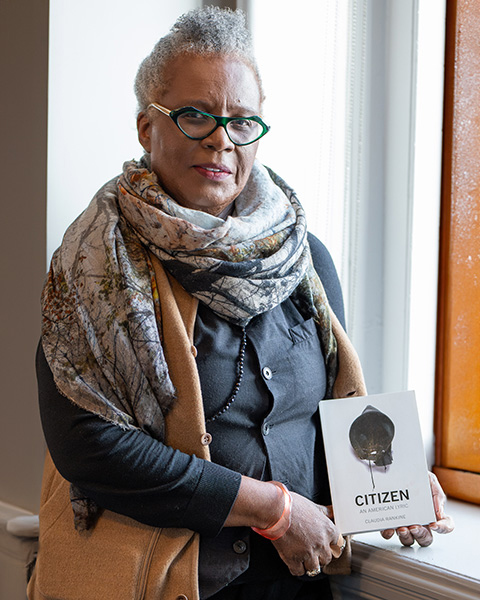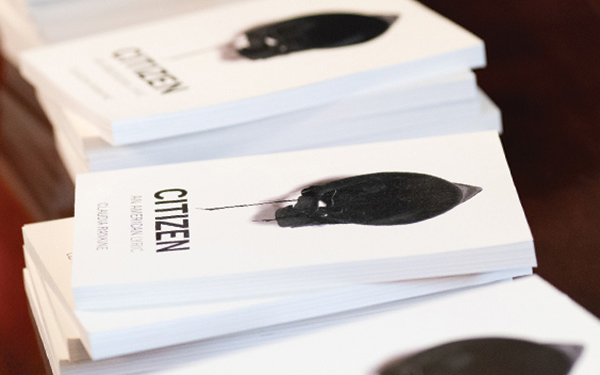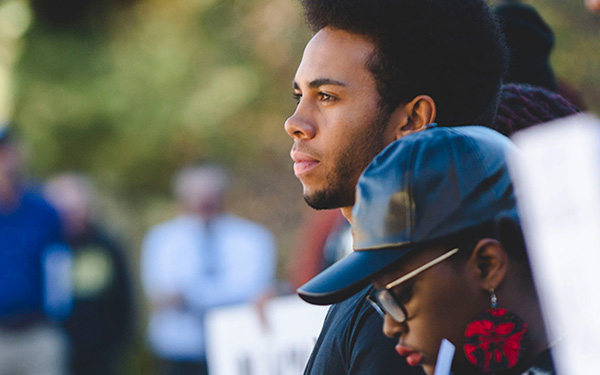Renowned author Claudia Rankine visits Regis
Her book, Citizen: American Lyric, hits the decade mark
By Sara Knuth
When Claudia Rankine released her book Citizen: An American Lyric in 2014, her mission was to address what was then unspoken: moments of day-to-day racism that were felt deeply — but didn’t have a language in culture. Moments like this, she said, “were able to sort of go under the radar, and yet they were having an impact on people’s professional, emotional lives, their ability to meet the next moment fully and openly.”
Rankine, professor of creative writing at New York University and renowned author of five books of poetry and three plays, continued the dialogue this fall with the Regis University community. She spoke in the St. John Francis Regis Chapel as the University’s annual Chester Alter Scholar and as part of the Good Trouble Conversations series.
The Good Trouble Conversations series is hosted each semester by the Community for Belonging and Equity in honor of the late Congressman John Lewis, who urged young people to “get in good trouble, necessary trouble and redeem the soul of America.” The Chester Alter Scholar Professor Lectureship, which began in 1988, invites scholars to campus to create a “climate for intellectual excitement.”
The book also was this year’s selection for One Book, One Regis, an annual series that intends to foster a shared reading experience that encourages meaningful discussions and connections within the Regis community. All first-year students are provided a copy of the book at the beginning of the academic year so they may engage in conversations throughout the semester. During her visit to Regis, Rankine met with students both in small group settings and the Office of First Year Experience’s Fall Friday discussion event to discuss her work.
A decade after Citizen was published, Rankine said moments of racism that were previously unspoken now have a language — one that is used commonly in American culture.
“Now, I feel like we have created the language for it — which is not to say it has stopped — but it definitely is enough a part of the culture that it is now in films and songs, in books,” Rankine said. “So, when we see it now, we understand it to be intentional, weaponized ... it is now part of the culture’s discourse. We do recognize it. We do talk about it.”
In an interview with the Regis Magazine before her visit to the University, Rankine attributed the new cultural awareness to technology. In Citizen, Rankine visits moments of racism experienced by professional tennis player Serena Williams, including questionable calls by umpires and harsh criticisms from the press.
FROM CITIZEN:“Again Serena’s frustrations, her disappointments, exist within a system you understand not to try to understand in any fair-minded way because to do so is to understand the erasure of the self as systemic, as ordinary. For Serena, the daily diminishment is a low flame, a constant drip. Every look, every comment, every bad call blossoms out of history, through her, onto you.”
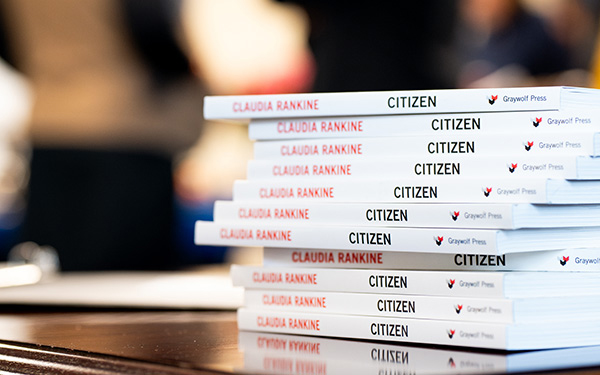
If social media was as ubiquitous as in those moments, Rankine said, they likely would have been caught.
“I think that the iPhone has made us aware of things that prior to the popularity of social media and the uses of social media, we had to take people’s word,” Rankine said. “We had to believe that what they were saying was true, and most of the time it probably was true, but ... it was hearsay. And suddenly, with social media and the iPhone, we were seeing for ourselves.”
In addition to her observations about Serena Williams and other people in the public eye, Rankine pulled from experiences that hit close to home. As she prepared to write Citizen, she interviewed friends about their experiences with daily moments of aggression. Their stories combined became part of her poetry. While she wasn’t surprised by the anecdotes themselves, Rankine said she was surprised at just how deeply her friends were affected by racism, moments that might have happened years ago.
“It had stayed with them, and it was a profound moment,” Rankine said.
“People often ask me, ‘What was the most difficult thing about writing this book?’ And it wasn’t the writing, it was the listening because sitting across from people telling me their stories, I was witnessing people breaking down, crying.”As Rankine prepared to visit Regis, she reflected on one play that impacted her as a college student: Antigone, a Greek tragedy that prompts readers to consider whether to take meaningful actions in the face of consequences. She said she is revisiting the play as she works on her next project. Rankine also said she tells all her students to read Small Things Like These by Claire Keegan.
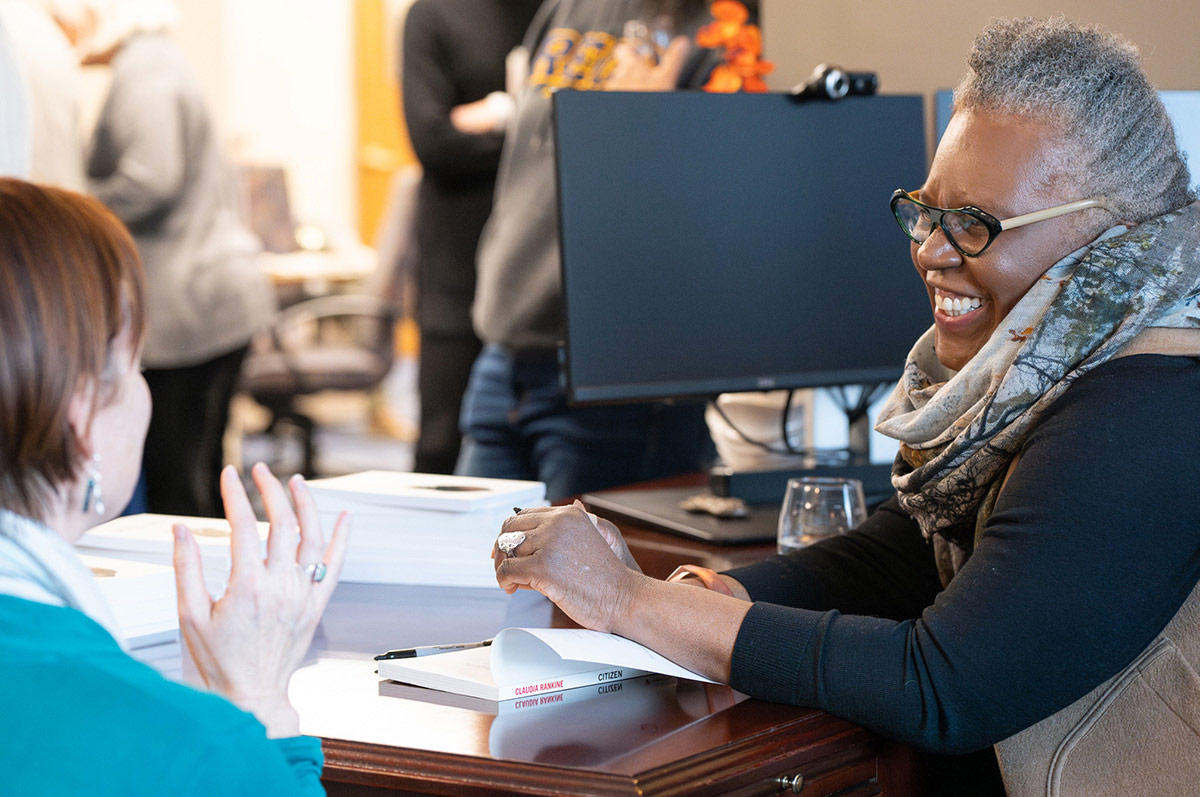
As she considered the impact she’d like to leave on her students, Rankine said she hopes her students see her as someone “who allows them to see themselves and allows them to understand their intentions, what’s available to them, the importance of failing, the importance of developing a practice,” she said.
“I have no interest in them succeeding in front of me,” she said. “I’m interested in their interests, and that’s what makes me excited: when I have a student who is trying all kinds of things because I know eventually that means when they settle down, they will settle down with a storehouse of possibilities.”
Citizen: An American Lyric
by Claudia Rankine
One Book, One Regis
Each year, the Regis First Year Experience team and the Dayton Memorial Library offer a book to support community and conversation. Throughout the semester, students, faculty and staff are welcome to engage in dialogue about the topics covered in each selection.
Good Trouble Conversations
These conversations are inspired by civil rights activist John Lewis who urged young people to speak out, be persistent, and be non-violent in demanding transformational societal change.

Article by Sara Knuth
About the AuthorMore from this issue
Share Your Thoughts
Email us or write in to the Regis University Magazine at 3333 Regis Blvd, L-27, Denver 80221

